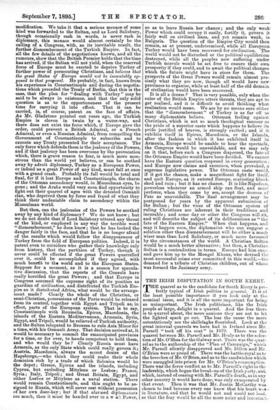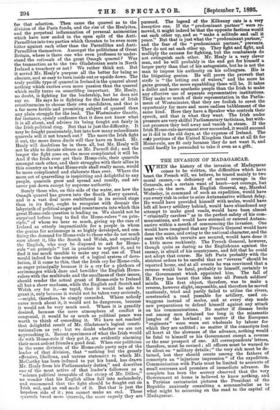THE IRISH DISPUTATION IN SOUTH KERRY.
THEquarrel as to the candidate for South Kerry is per- fectly typical of Irish politics in general. It is of the least possible importance if you look only at the nominal issue, and it is all the more important for being so unimportant. The Irish politicians, like the Irish people at large, delight in a quarrel. And the less there is to quarrel about, the more anxious they are not to let the lighted spark go out. The less the cause the more ostentatiously are the shillelaghs flourished. Look at the • great internal quarrels we have had in Ireland since Mr. . Parnell " took off his coat" in 1879. There was the quarrel between Mr. Parnell and Mr. Healy as to the selec- tion of Mr. O'Shea for the Galway seat. There was the quar- rel as to the authorship of the "Plan of Campaign," which Mr. Parnell silently disapproved and Mr. Dillon and Mr. . O'Brien were so proud of. There was the battle-royal as to the breeches of Mr. O'Brien, and as to the sandwiches which were smuggled into prison for Mr. O'Brien's consumption. There was the fierce conflict as to Mr. Parnell's right to the - leadership, which began the break-up of the Irish party. and which, instead of ceasing with Mr. Parnell's death, as in any other country it would have done, was only exasperated by that event. Then it was that Mr. Justin McCarthy was chosen to lead because every one knew that his heart wds,, in literature, and that he would not and could not lead, so that the fray would be all the more noisy and incessextk, for that selection. Then came the quarrel as to the division of the Paris funds, and the rise of the Healyites, and the perpetual inflammation of personal animosities which have now ended in the open split of the Anti- Parnellites into two parties which threaten to be even more bitter against each other than the Parnellites and Anti- Parnellites themselves. Amongst the politicians of Great Britain, where is there one who even professes to under- stand the rationale of the great Omagh quarrel ? Was the transaction as to the two Gladstonian seats in North Ireland a treachery or not? We rather think not. But it served Mr. Healy's purpose all the better for being so obscure, and so easy to turn inside out or upside down. The truly prolific type of quarrel in Ireland is the quarrel about nothing which excites even more passion than the quarrel which really turns on something important. Mr. Healy, no doubt, is fighting for the leadership, but he does not say so. He says he is fighting for the freedom of Irish constituencies to choose their own candidates, and that is a far more fertile and promising subject of quarrel than any plain struggle for the lead. The Westminster Gazette, for instance, openly confesses that it does not know what it is all about, and advises its being fought out fairly in the Irish political ring. But that is just the difficulty. It may be fought passionately, but into how many subordinate quarrels will it not branch out ? The more the Irish fight it out, the more fierce duels will they have on hand. Mr. Healy will doubtless be in them all, but Mr. Healy will not be able to dictate silence as Mr. Parnell did ; and the longer the fight goes on, the more complicated it will be. And if the Irish ever get their Home-rule, their quarrels amongst each other, and their struggles with their allies in this country as to what Home-rule shall really mean, would be more complicated and elaborate than ever. Where the mere act of quarrelling is inspiriting and delightful to any people, quarrels grow and spread and ramify, and are never put down except by supreme authority.
Surely those who, on this side of the water, see how the Omagh quarrel has grown into the South Kerry quarrel, and is a vast deal more embittered in its second stage than in its first, ought to recognise with despair the labyrinth of political anger and resentments into which this great Home-rule question is leading us. We should not be surprised before long to find the Home-rulers " on prin- ciple," of whom we hear so much, giving up the case of Ireland as utterly impracticable for a people in whom the genius for scrimmage is so highly developed, and con- fining the demand for Home-rule to those who do not much care about it, like the Scotch and Welsh, and especially the English, who may be disposed to ask for Home- rule " on principle " but in practice to neglect it, and to find it too much trouble to make any real use of. That would indeed be the nemesis of a logical system of devo- lution, if it came to this, that the Irish cry for Home-rule, so eager principally because it is a cry for a plethora of scrimmages whicl daze and bewilder the English Home- rulers with the multitude and the smallness of their issues, should render the actual grant of Home-rule to Ireland all but a sheer madness, while the English and Scotch and Welsh cry for it,—so tepid, that it would be safe to grant it, only because it would not be taken very seriously, —might, therefore, be simply conceded. Where nobody cares much about it, it would not be dangerous, because it would not be very much used. Where it is greedily desired, because the mere atmosphere of conflict is congenial, it would be as much as political peace was worth to think of conceding it. We have not reached that delightful result of Mr. Gladstone's logical consti- tutionalism as yet ; but we doubt whether we are not approaching it. Recent specimens of what the Irish would do with Home-rule if they got it, are evidently alarming their most ardent friends a good deal. When one politician in the same division of the Home-rule party says of the leader of that division, that " nothing but the grossly offensive, libellous, and untrue statement to which Mr. McCarthy has been induced to put his hand, has drawn Mr. Healy from his Parliamentary duties," and describes one of the most active of that leader's followers as a " solemn political incapable of the stamp of Mr. Dillon," no wonder that his English allies fall into melancholy, and recommend that the fight should be fought out on Irish soil, and an end made of it. But that is just the hopeless side of it ; you cannot make an end. These quarrels breed more quarrels, the more eagerly they are pursued. The legend of the Kilkenny cats is a very deceptive one. If the " predominant partner" were re- moved, it might indeed be that the opposite factions would. eat each other up, and so " make a solitude and call it peace." But that is just what the " predominant partner," and the fear of the " predominant partner," prevents. They do not eat each other up. They fight and fight, and multiply the excuses for fighting, but the combatants do not extinguish each other. Mr. Healy is a very clever man, and he will probably in the end get for himself a larger party than that of his antagonists, but he is not the man to impose his authority on his colleagues. His is the litigating genius. He will prove the proverb that strife is " the letting out of waters," and the more he gains ground, the more squabbling there will be. It takes a duller and more apathetic people than the Irish to make any effective use of separate representative institutions. They make so much of their representation in the Parlia- ment of. Westminster, that they are foolish to covet the opportunity for more and more endless babblement of the same kind. Here they have a Speaker who controls their speech, and that is what they want. The Irish under pressure are very skilful Parliamentary tacticians, but with- out pressure they boil away and vanish in steam. If the Irish Home-rule movement ever succeeded, it would succeed as it did in the old days, at the expense of Ireland. The only portions of the United Kingdom that are at all fit for Home-rule, are fit only because they do not want it, and could hardly be persuaded to take it even as a gift.,



































 Previous page
Previous page